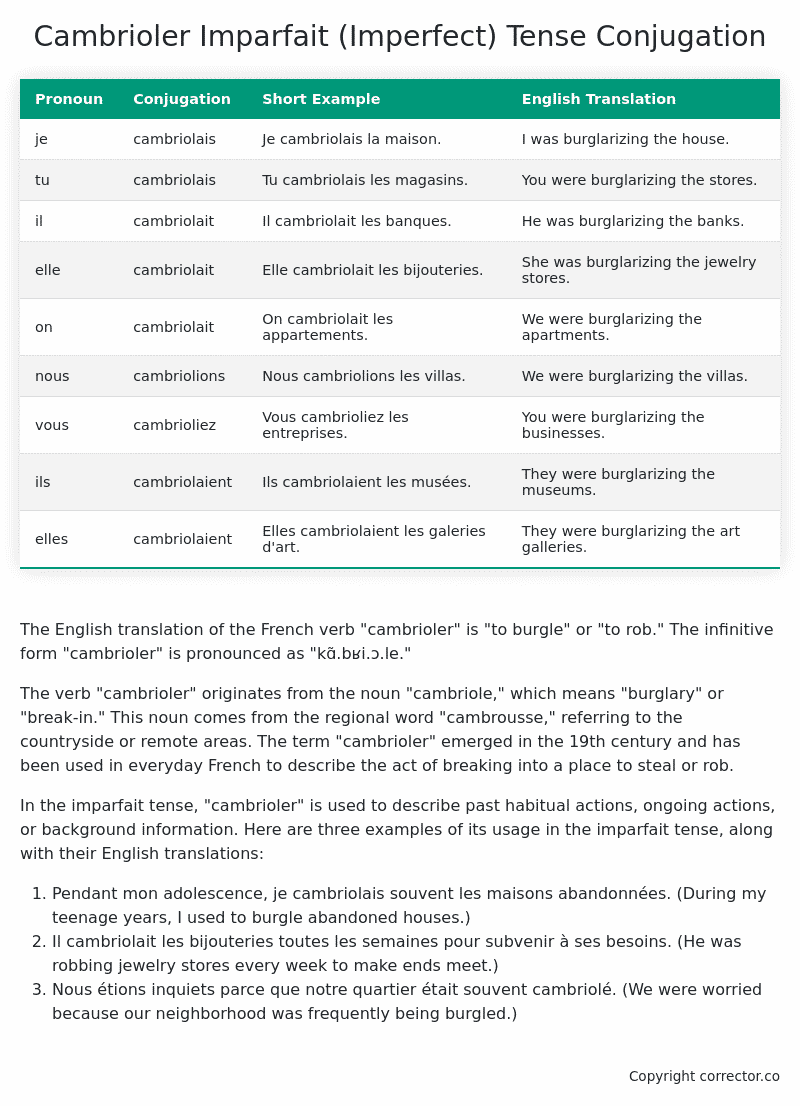Imparfait (Imperfect) Tense Conjugation of the French Verb cambrioler
Introduction to the verb cambrioler
The English translation of the French verb “cambrioler” is “to burgle” or “to rob.” The infinitive form “cambrioler” is pronounced as “kɑ̃.bʁi.ɔ.le.”
The verb “cambrioler” originates from the noun “cambriole,” which means “burglary” or “break-in.” This noun comes from the regional word “cambrousse,” referring to the countryside or remote areas. The term “cambrioler” emerged in the 19th century and has been used in everyday French to describe the act of breaking into a place to steal or rob.
In the imparfait tense, “cambrioler” is used to describe past habitual actions, ongoing actions, or background information. Here are three examples of its usage in the imparfait tense, along with their English translations:
- Pendant mon adolescence, je cambriolais souvent les maisons abandonnées. (During my teenage years, I used to burgle abandoned houses.)
- Il cambriolait les bijouteries toutes les semaines pour subvenir à ses besoins. (He was robbing jewelry stores every week to make ends meet.)
- Nous étions inquiets parce que notre quartier était souvent cambriolé. (We were worried because our neighborhood was frequently being burgled.)
Table of the Imparfait (Imperfect) Tense Conjugation of cambrioler
| Pronoun | Conjugation | Short Example | English Translation |
|---|---|---|---|
| je | cambriolais | Je cambriolais la maison. | I was burglarizing the house. |
| tu | cambriolais | Tu cambriolais les magasins. | You were burglarizing the stores. |
| il | cambriolait | Il cambriolait les banques. | He was burglarizing the banks. |
| elle | cambriolait | Elle cambriolait les bijouteries. | She was burglarizing the jewelry stores. |
| on | cambriolait | On cambriolait les appartements. | We were burglarizing the apartments. |
| nous | cambriolions | Nous cambriolions les villas. | We were burglarizing the villas. |
| vous | cambrioliez | Vous cambrioliez les entreprises. | You were burglarizing the businesses. |
| ils | cambriolaient | Ils cambriolaient les musées. | They were burglarizing the museums. |
| elles | cambriolaient | Elles cambriolaient les galeries d’art. | They were burglarizing the art galleries. |
Other Conjugations for Cambrioler.
Le Present (Present Tense) Conjugation of the French Verb cambrioler
Imparfait (Imperfect) Tense Conjugation of the French Verb cambrioler (You’re reading it right now!)
Passé Simple (Simple Past) Tense Conjugation of the French Verb cambrioler
Passé Composé (Present Perfect) Tense Conjugation of the French Verb cambrioler
Futur Simple (Simple Future) Tense Conjugation of the French Verb cambrioler
Futur Proche (Near Future) Tense Conjugation of the French Verb cambrioler
Plus-que-parfait (Pluperfect) Tense Conjugation of the French Verb cambrioler
Passé Antérieur (Past Anterior) Tense Conjugation of the French Verb cambrioler
Futur Antérieur (Future Anterior) Tense Conjugation of the French Verb cambrioler
Subjonctif Présent (Subjunctive Present) Tense Conjugation of the French Verb cambrioler
Subjonctif Passé (Subjunctive Past) Tense Conjugation of the French Verb cambrioler
Subjonctif Imparfait (Subjunctive Imperfect) Tense Conjugation of the French Verb cambrioler
Subjonctif Plus-que-parfait (Subjunctive Pluperfect) Tense Conjugation of the French Verb cambrioler
Conditionnel Présent (Conditional Present) Tense Conjugation of the French Verb cambrioler
Conditionnel Passé (Conditional Past) Tense Conjugation of the French Verb cambrioler
Conditionnel Passé II (Conditional Past II) Tense Conjugation of the French Verb cambrioler
L’impératif Présent (Imperative Present) Tense Conjugation of the French Verb cambrioler
L’impératif Passé (Imperative Past) Tense Conjugation of the French Verb cambrioler
L’infinitif Présent (Infinitive Present) Tense Conjugation of the French Verb cambrioler
L’infinitif Passé (Infinitive Past) Tense Conjugation of the French Verb cambrioler
Le Participe Présent (Present Participle) Tense Conjugation of the French Verb cambrioler
Le Participe Passé (Past Participle) Tense Conjugation of the French Verb cambrioler
Struggling with French verbs or the language in general? Why not use our free French Grammar Checker – no registration required!
Get a FREE Download Study Sheet of this Conjugation 🔥
Simply right click the image below, click “save image” and get your free reference for the cambrioler imparfait tense conjugation!

Cambrioler – About the French Imparfait Tense
NOTE: To take a deep dive into all the French tenses then see our article on Mastering French Tense Conjugation.
Formation of the Imparfait Tense
For regular -er verbs:
For regular -ir verbs
For regular -re verbs
Common Everyday Usage Patterns
Description of Past Habits
Background Information
Mental and Emotional States
It’s employed to express emotions, thoughts, or physical sensations in the past. For example: “J’étais content quand il est arrivé.” (I was happy when he arrived.)
Ongoing Actions
Points to Note About the Imparfait Tense
Passé Composé vs. Imparfait
Conditional
Si Clauses
Narration
I hope you enjoyed this article on the verb cambrioler. Still in a learning mood? Check out another TOTALLY random French verb imparfait conjugation!


